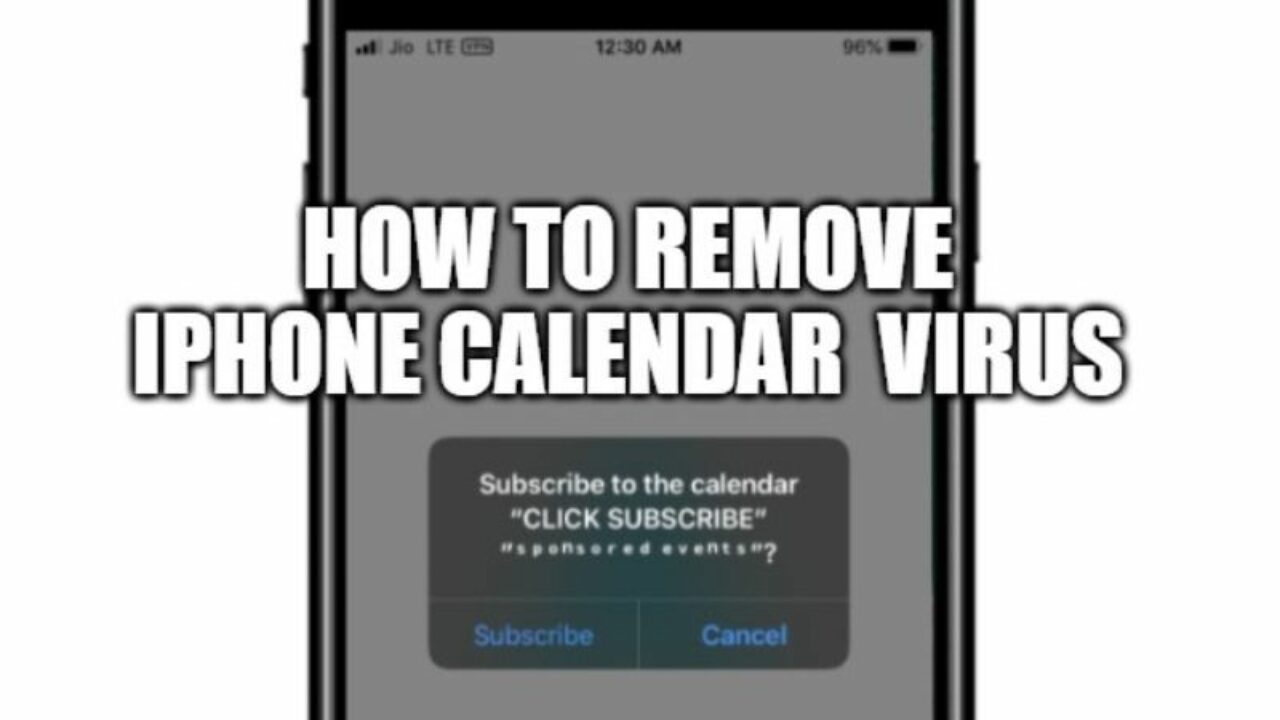Calendar Virus – I am passionate about data security and technology. I have more than 10 years of experience working in various companies related to computer technical troubleshooting and internet security. I have worked as a writer and editor for pcrisk.com since 2010.
Follow me on Twitter and LinkedIn to stay informed about the latest online security threats. Contact Tomas Meskaskas. The website Notice-device.club appears in the event message claiming that your device is vulnerable to online threats, cyber malicious code and may suffer damage if the user does not take any action.
Calendar Virus
 Source: i.ytimg.com
Source: i.ytimg.com
In most cases, Apple devices that see this warning do not have any specific problems. Formerly called the notice-booster.best virus, the relaunched spam campaign displays fraudulent event alerts called Notices Booser Best, congratulating a potential victim on being the winner of an annual contest and claiming a $1 prize 541
Get Rid Of Rogue Calendar Events Virus Using Combo Cleaner Removal Tool
requires following instructions for In most cases, users believe that spam activity is related to malware, however this is not the case. In most cases, fraudulent techniques (phishing emails, fake alerts on dubious websites, etc.) are used to add an entry to a malicious profile on an iPhone or Android or these devices.
So the only way to get rid of these constant scam messages is to delete these entries. We strongly recommend that you do not trust any messages or websites they open – they are designed to get visitors to install unwanted software, provide personal information or even pay for dubious apps of “services”.
Can go (such as remote removal of non-existent viruses). Using a VPN can improve your security. Designed to work well on iPhones and iPads, Kaspersky VPN Secure Connection encrypts your data while you browse, so no one can intercept the data you send or receive.
In the Settings window, select “Extensions” and look for any recently installed suspicious extensions. Once found, click the “Uninstall” button next to it/them. Note that you can safely uninstall any add-ons from your Safari browser – none critical to normal browser operation.
Get Rid Of Unwanted Ads In Web Browser On Mac
You should go to the Calendar application and tap on Calendar at the bottom. You should find all suspicious entries and press i in the circle to get more information and options. Scroll down so you can tap Remove Calendar.
After that, you may need to block pop-ups in your browsers and clean additional installed extensions or tools. To do so, follow the removal guide below. Clicking on the link below redirects the message to a suspicious website, which tells you a reason why you have been selected to participate in the lottery and then sends you an email with your name, address, phone number and similar information.
Asks to fill the form. No matter how enticing the notification cleaner best ads look, don’t submit required information because you could unwittingly subscribe to a useless service or, worse, fraud. There is a growing destructive trend of this type, affecting iPhone and Mac users.
It relies on a combination of social engineering and malware to deface someone’s calendar app. Affected users receive numerous spam events and invitations to their built-in calendar. As if the influx of these entries wasn’t enough to ruin a self-organized user experience, they are filled with hyperlinks that lead to shady websites.
 Source: media.istockphoto.com
Source: media.istockphoto.com
Scammers Improve Their Methods And Make Their Schemes More Tricky Than Ever
If your device is running the latest version (iOS 14), go to Settings > Calendar > Accounts and look for suspicious items there. If you see a shady account, delete it without thinking. Remember that URLs like notice-iphone.club or alert-booster.club should never be trusted.
Below you can find a guide that will show you how to reset the browser, eliminate unwanted messages and completely clean your machine from all such threats, so that you can avoid damage and viruses. can remove
To eliminate potential malware infections, scan your Mac with a legitimate antivirus program. Our security researchers recommend using a combo cleaner. A limited seven-day free trial is available. Combo Cleaner is owned and operated by Rcs Lt, the parent company of PCRisk.com.
read more. You can remove virus damage using ReimageIntego. SpyHunter 5Combo Cleaner and Malwarebytes are recommended for detecting potential unwanted programs and viruses along with all their files and their associated registry entries. This phenomenon is (typically) an Apple device targeting campaign that focuses on misleading ads and push messages that trigger clicks and permissions so that events can be added to applications.
How To Avoid Installation Of Potentially Unwanted Applications
When people start seeing these entries and other intrusive content, trying to disavow them, remove them or turn off additional pop-ups and messages that appear after a redirect becomes a difficult process. or click on the hyperlink provided.
A Mac maintenance and security app called Combo Cleaner is a one-stop tool for detecting and removing spammy calendar event viruses. This technique has significant advantages over manual cleaning, as the tool receives hourly virus definition updates and can accurately detect even the latest Mac infections.
Then find all suspicious calendar entries (they are usually named after promoted websites and their icon colors correspond to unwanted events) and press the “i” symbol in a circle. Then scroll to the bottom of the screen, tap on “Remove Calendar” and confirm it: Once the new entry is installed, users start getting Alert-booster.club pop-ups through their phones with different content.
will give In most cases, the threat actors behind this scam use fake messages to provide personal information by downloading unknown applications, signing up for some supposedly useful service
, or visiting websites with questionable content. .
An Insanely Easy Exploitation Trick
These fake alerts are all focused on fraud, to mislead the user to come in contact with a sponsored page, third-party service and potentially dangerous content. Although they are not malicious in themselves, websites that lead to download pages and other rogue domains can trigger malware directly on the machine.
Pop-up messages redirect to shady or malicious websites, which can fool many people. Then you have a difficult question and there are some ways to remove viruses. Since the breach is managed to change calendar settings, it may also try to change settings, add files, programs or disable certain features on your machine.
 Source: novirus.uk
Source: novirus.uk
You need to consider this and ensure that any possible risk of recurrence of these intrusive symptoms is prevented. Notice Cleaner Best is another iPhone scam, which can be triggered either by a potentially unwanted program (PUP) on the device or by a malicious website that has added events without the user’s permission.
Also known as Notes-cleaner.best, the scam can be used to spread malware or extortion campaigns. Notice Cleaner Best Scam usually creates a scheduled event that says: Alert-booster.club is another domain that infiltrates iPhones with intrusive spam.
How To Get Rid Of The Calendar Virus On Iphone
Like other similar scams, breaches occur when users accept a calendar invitation via a phishing email or when they accidentally click on a link that comes from a malicious website. These questionable entries seem to appear out of nowhere.
Spam can invite people to participate in various offers, sales, register on dating portals, claim prizes, etc. Often people fall for clicking on the same ads that appear in the legitimate app, making them seem more reliable (this is not the case though).
PUPs spread during freeware installations when the person downloading the desired software chooses the Recommended or Fast options and automatically lets all intruders onto the device. You have to choose advanced or custom installations and, most importantly, trust authorized developers and application providers to avoid this pre-bundling.
On your iPhone or iPad, go to Settings > Safari and turn on Block pop-ups and fraudulent website warning. On your Mac, you can find this option in Safari > Preferences. The Websites tab includes options to block some or all pop-ups, and you can enable warnings for fraudulent websites in the Security tab.
What Is A Calendar Virus?
To begin with, the browser settings taken over by the Calendar Spam virus should be reset to their default values. While this will erase most of your customizations, web browsing history, and any temporary data stored by websites, malicious interference should be eliminated just the same.
The steps to complete this process are outlined below: To ensure that all files remain intact, you should prepare regular data backups. You can choose cloud-based or physical copies that you can restore later in the event of a disaster.
If your backups are also lost or you never bothered to prepare one, Data Recovery Pro may be your only hope to get your precious files back. Each message contains a link and a short description, such as “Kate sends you 5 pictures” or “It’s your lucky day.”
However, there is no option to easily disable these notifications, and this is the main reason why this type of problem is particularly annoying and irritating for users. Spam messages include invitations or additional pop-ups with accept or decline buttons.
 Source: technclub.com
Source: technclub.com
Lost Your Files? Use Data Recovery Software
Unfortunately, no matter which button you press, they all trigger the same function. In some cases, such misleading content leads to further push notification redirects, or you encounter pop-ups directly on your desktop from there, inadvertently installing PUPs or viruses.
Experts [5] note that this interaction can also be essential for a fraudster to ensure that your email address is active and can be more targeted towards scam messages and malware content. You should only delete received email that raises questions or is suspicious because of the content or original sender.
This is probably the best way to avoid spam campaigns and exposure to these shady services and online content. If a spammer knows the email address associated with your calendar account, they can send you fraudulent calendar invitations that contain infectious hyperlinks.
It’s relatively easy for spammers to get hold of your email address – this can happen if: To implement a fix that lasts, you need to identify the root cause of these unpleasant events and get rid of them.
Unwanted Calendar Events In Detail
This is a questionable subscription that you may have inadvertently selected at some point. Note that the method depends on your iOS version. Have you started seeing strange appointments or reminders in your iPhone’s Calendar app?
If so, you may be worried that your calendar has a virus or has been hacked. In fact, what probably happened is that you subscribed to a third-party calendar that generates spam appointments. It is important that you do not click on any links within these meetings, as they may lead to malicious websites that infect your device and steal your information.
Read on to find out why you’re getting these notifications and how to get rid of them. Clicking on iPhone ads poses a security risk to your device as the hyperlinks provided may link to rogue pornographic websites, fake software download sites, or rogue survey domains.
So, even if some of the slogans placed in the calendar events look attractive, don’t fall for clicking them. ਸਭ ਤੋਂ ਆਮ ਸਪੈਮ ਵਿਗਿਆਪਨ ਹਨ: ਇਸ ਤੋਂ ਇਲਾਵਾ, ਆਟੋਮੈਟਿਕ ਹੱਲ ਮਾਲਵੇਅਰ ਕੋਰ ਫਾਈਲਾਂ ਨੂੰ ਸਿਸਟਮ ਢਾਂਚੇ ਵਿੱਚ ਡੂੰਘਾਈ ਨਾਲ ਲੱਭ ਲਵੇਗਾ, ਜੋ ਕਿ ਨਹੀਂ ਤਾਂ ਲੱਭਣਾ ਇੱਕ ਚੁਣੌਤੀ ਹੋ ਸਕਦਾ ਹੈ.
Calendar Virus Removal Options
ਕੰਬੋ ਕਲੀਨਰ ਨਾਲ ਸਪੈਮ ਕੈਲੰਡਰ ਇਵੈਂਟਸ ਨੂੰ ਠੀਕ ਕਰਨ ਲਈ ਇੱਥੇ ਇੱਕ ਵਾਕਥਰੂ ਹੈ:
calendar virus iphone, how to remove calendar virus, remove calendar virus iphone, iphone virus calendar events, iphone calendar virus 2021, google calendar virus, apple iphone calendar virus, apple calendar virus

